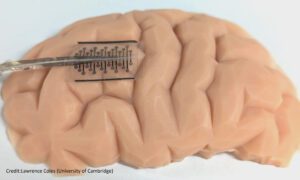 Tiny folding implants could make epilepsy surgery safer and improve diagnosis, say UK researchers.
Tiny folding implants could make epilepsy surgery safer and improve diagnosis, say UK researchers.
In a new study, the University of Oxford-led research team said that its electrodes, inspired by the Japanese art of origami, can fit through a surgical hole as small as 6mm.
The device is a flat, rectangular silicone wafer with 32 embedded electrodes. It folds up like an accordion and surgeons can then unfurl it on the brain’s surface to a size five times larger.
The researchers hope that this folding electrode will help to find where seizures start in the brain and make diagnosis safer and more efficient.
The researchers said this technology could also cut down recovery times and lower infection risk of surgery.
At the moment, surgeries performed to monitor electrical activity in the brain are either very invasive or only cover a small surface area of the brain. According to Christopher Proctor, associate professor at the University of Oxford, this technology represents a “new approach” to connect with “large areas of the brain through a keyhole-like surgery”.
“Innovative and promising”
 Dr Damiano Barone, a neurosurgeon and clinical lecturer at the University of Cambridge, also involved with the research, said that the aim is to “improve the level of diagnostic accuracy in epilepsy and, therefore, (make) safer epilepsy surgery open to a larger number of people”.
Dr Damiano Barone, a neurosurgeon and clinical lecturer at the University of Cambridge, also involved with the research, said that the aim is to “improve the level of diagnostic accuracy in epilepsy and, therefore, (make) safer epilepsy surgery open to a larger number of people”.
The researchers added that this technology could have potential to help with other conditions and problems too, for example people who are paralysed.
Commenting on the research, Tom Shillito, health improvement and research manager at Epilepsy Action, said: “The journey to getting an epilepsy diagnosis can be a complex one, often requiring invasive procedures to record and monitor brain activity and determine follow-up treatment.
“At the same time, people experiencing seizures will also be coming to terms with having a life-changing and fluctuating condition which can, in some cases, be fatal.
“Around 79 people in the UK will learn every day they have epilepsy, so the need for new diagnostic treatments that could lessen that impact and give people a better quality of life has never been greater.
“It’s exciting to hear the positive outcomes of the initial study’s findings which could translate into a really innovative and promising treatment for people with epilepsy – we look forward to seeing how it develops.”
You can find the research in the journal Nature Communications.
More articles







